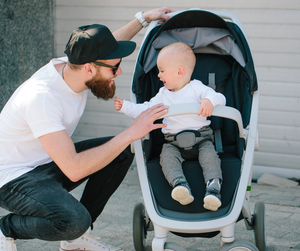Colicky?
Colic in Babies: Symptoms, Causes, and Parental Advice
Do you have an infant who cries for hours and refuses to be soothed despite your best efforts? Continue reading to learn about the symptoms of colic, as well as the causes and treatments available to help you get through it.
You bring your infant home and wonder for weeks at your infant who does nothing but sleep, feed, urinate, and cry.
A few weeks later, he bursts out in loud, ear-shattering wails, complete with clenched fists, flailing legs, and an unhappy red face.
You can't console your weeping baby no matter what you do, and he repeats these terrible, stressful experiences every night at the same time for what seems like an eternity. Hello and welcome to the realm of colic.
What exactly is colic?
The truth is that all babies cry. At this young age, it is the best (and only) way for them to communicate their requirements. And as parents, we are physiologically designed to respond in order to meet those requirements.
However, in babies suffering from colic, the sobbing begins abruptly and for no apparent reason... and there is no known cure.
Colic is not an illness or a diagnosis, but rather a collection of perplexing behaviours. It's essentially simply a catch-all word for excessive crying in otherwise healthy babies – the trouble is, there's no cure other than time. It's also rather common, affecting about 1 in every 5 infants.
These fussy spells might last for hours at a time, even late at night. Worse, no matter how hard you try — and you will — it is exceedingly difficult to settle a colicky infant, which only adds to your irritation, concern, and weariness.
Doctors typically use the "rules of three" to diagnose baby colic. Your infant is crying:
At least three hours every day
At least three times every week
Lasts at least three weeks in a row
When does colic begin and when does it end?
The good news is that newborn colic is not permanent. Most bouts begin at 2 to 3 weeks of age (longer in premature newborns), peak around 6 weeks, and then begin to taper off by 10 to 12 weeks.
Most colicky children appear to be miraculously cured by 3 months (though this is normally a little later in preterm newborns). The colic may cease abruptly — or gradually, with some good days and some terrible days until the most of them are excellent and the stage has passed.
Meanwhile, a little information and a lot of patience will get you through till the storm passes.
Symptoms of colic
How can you tell if your baby is colicky? Here are some colic symptoms to look out for:
It's worth reiterating, but colic often follows a "three rules" pattern: Crying lasts at least three hours per day, three days per week, and for at least three weeks in a row.
Crying frequently occurs at the same time every day (usually in the late afternoon or early evening, but it can vary).
Your baby appears to be weeping for no apparent reason (not because he has a dirty diaper or is hungry or tired).
Baby may raise his legs, clasp his fists, and move his legs and arms more.
Your kid will frequently close his eyes or open them wide, furrow his forehead, and even short hold his breath.
His bowel activity may increase, causing him to produce gas or spit up.
The sobbing disrupts eating and sleeping – the baby desperately seeks a nipple only to reject it once sucking begins, or dozes for a few moments only to wake up screaming.
What is the distinction between colic and regular crying?
There is no precise description of colic or how (or whether) it varies from other types of crying.
However, experts generally agree that colic weeping is louder, more powerful, and higher-pitched than regular crying, and can even sound like screaming at times.
Colicky babies appear inconsolable and cry more throughout the day than non-colicky babies. (It may feel like it's going on around the clock, much to the chagrin of tired and worried parents, but it could only be a few hours.)
The majority of the time, colicky episodes occur on a daily basis, while some newborns have a night off every now and then.
What causes infant colic?
While the precise origin of colic is unknown, specialists do know that it is not caused by genetics or anything that occurred during pregnancy or childbirth. It also has nothing to do with parental abilities. It's also not anybody's fault.
Having stated that, below are some theories about the reasons of colicky crying:
Senses that have been overstimulated
One reason is that newborns have a built-in mechanism for filtering out sights and sounds, allowing them to sleep and eat without being disturbed by their surroundings. However, by the end of the first month, this mechanism has vanished, leaving neonates more susceptible to the stimuli in their surroundings. With so many new sensations bombarding them, some infants, especially at the end of the day, get overwhelmed. They cry to relieve tension (and cry and cry). Colic, according to the hypothesis, disappears when the baby learns to filter out some ambient stimuli and, as a result, avoids sensory overload.
A digestive system that is still developing.
Food digestion is a difficult chore for a baby's brand new gastrointestinal tract. As a result, food may travel through too rapidly and not entirely break down, causing pain from gas in the intestines.
Acid reflux in infants. Infant GERD (gastroesophageal reflux disease) has been observed to provoke episodes in colicky babies, but it does not cause colic. Infant GERD is frequently caused by an undeveloped lower esophageal sphincter, the muscle that prevents stomach acid from running back up into the throat and mouth, causing esophageal irritation. Symptoms include spitting up frequently, poor eating, and irritation during and after feedings. The good news is that most babies outgrow GERD by the age of one (and colic usually goes away long before then).
Food sensitivities or allergies
Some doctors feel that colic in formula-fed newborns is caused by a reaction to cow's milk proteins (or lactose intolerance). In breastfed newborns, colic may be caused by a reaction to specific items in Mom's diet. In either case, these allergies or sensitivities can induce gut pain, which can trigger colicky behaviour.
Tobacco usage
Several studies have found that mothers who smoke during or during pregnancy are more likely to have colicky newborns, and secondhand smoking may also be a factor. Despite the existence of a correlation, it remains unknown how cigarette smoke is associated to colic. For many other important health concerns, the bottom line is: don't smoke or allow anybody else to smoke around your infant.
Remedy for infant colic
Along with irritation and weariness, you may experience emotions of inadequacy and guilt as you strive in vain to calm your fussy infant. While remaining quiet is easier said than done, these tactics may assist alleviate the strain until the colic passes.
Just give each a fair go before moving on (and don't try too many tactics at once, or you'll overload baby's circuits — and increase the sobbing you're trying to stop). Consult your doctor for advice and possible causes of your baby's colic.
If you suspect overstimulation, take the following steps:
A baby's only way of communicating his wants is to cry. But it's also his only means of exerting any control over a huge and befuddling new environment: he cries, you rush to his side – powerful stuff when you're otherwise powerless. In fact, research show that responding quickly to your baby's cries reduces his sobbing over time.
Excitement should be avoided. Keep guests to a minimum and avoid exposing your kid to new experiences in stimulating situations, especially in the late afternoon and early evening. Keep an eye on how your baby reacts to different stimuli and avoid any that appear to upset him or her.
Create a sense of calm. Attempting to create a tranquil environment for your infant may aid in his relaxation. Dim the lights, speak or sing in soothing tones (or don't speak at all), and minimise extraneous noises and distractions.
If you suspect stomach problems, do the following:
Apply gentle pressure to the baby's tummy. Some colicky newborns benefit from pressure on the belly, and the power of touch may be incredibly soothing for both parent and child. Place your baby face-down on your lap or upright with his tummy against your shoulder, or try the "colic carry," in which your baby rests face-down with his belly resting on your arm. Then, while holding him, softly rub or stroke his back.
Try burping your child. If your baby's inconsolable fussiness is caused by gas, burping him may help reduce the discomfort. Check to see if you're effectively burping your infant.
Inquire about antigas drops. According to research, lowering your gas intake may help you feel better (and crying). So, consult your doctors about using simethicone gas drops, which act by breaking up gas bubbles and can alleviate your baby's problems. Though research hasn't conclusively demonstrated that this medication is effective for colic, your doctor may believe it's worth a shot.
Think about probiotics. Probiotic drops may be able to reduce crying in some colicky kids, owing to their ability to alleviate gastrointestinal issues (probiotic bacteria grow naturally in the digestive tract and help promote intestinal health). Again, data is limited, but consult your paediatrician to see if you should try it.
Keep an eye on what you eat. If you are nursing, see your doctor about temporarily avoiding any foods from your diet that may create digestive difficulties for your infant, such as gas-producing cruciferous vegetables (cabbage, cauliflower), acidic citrus fruits, or allergic foods (dairy, soy, wheat, eggs, peanuts, tree nuts, fish).
Inquire about changing formulas. Some formula-fed newborns benefit from switching from a normal variety to one tailored for sensitive tummies or one that does not contain cow's milk. According to research, giving colicky newborns hypoallergenic whey-hydrolyzed formula reduces colic symptoms in certain babies. Just make sure to seek your doctor's permission before making the transition. Also, avoid casein-hydrolyzed formulas or partially hydrolyzed formulas as colic treatments because there isn't enough evidence that they perform.
Other soothing methods for colicky babies include:
Get close: Cuddling, wearing, or carrying your baby not only provides him with the joy of security and physical proximity to you (and after 9 months of constant proximity, that may be exactly what baby is crying for), but it may also help you tune in to his needs. Are you concerned that holding your infant too much may cause him to become spoiled or clingy? Set those worries aside. You can't spoil a newborn, so if cuddling him helps to soothe him, go ahead and hug.
Swaddle: Toss a blanket in the dryer and drape it around your child while it's still warm. The combination of warmth and a sense of security may aid in the drying of baby's tears.
Make use of a white noise player. Babies may find the hum of the vacuum machine or dryer soothing (it reminds them of the womb). A white noise machine can also be beneficial.
Yum Yum Mama White Noise Player Machine
Play calming music. A wailing baby may also respond to quietly played classical music or quiet singing of a lullaby. Other infants prefer nature sounds or the hum of a fan. It can also assist to repeat "shh" or "ahh" to your child. Experiment to locate something that your baby seem to enjoy.
Set the wheels in action. Attempt swinging or rocking. Gentle movement is soothing to newborns because it reminds them of their time in the womb.
Provide a pacifier. Some colicky newborns appear to want to eat all the time, which could be because sucking is soothing rather than because they are hungry. If your infant appears ravenous on a regular basis and adequate feedings do not seem to satisfy him, a pacifier may be beneficial. However, if you are unsure whether your infant is getting enough to eat at mealtimes, consult with your doctor.
Get out of the house as soon as possible. A simple adjustment to an outdoor area can sometimes transform a baby's mood. Movement can also be beneficial. Take your baby for a stroller or carrier walk, or strap him into the car seat for a drive (but turn around and head home if the sobbing persists in the car – otherwise, it could distract you from the road).
Remember, never give your baby any medication, herbal or otherwise, without first consulting with your paediatrician. Also, always consult your doctor before making any changes to your or your baby's diet.
Water gripe and colic
Gripe water, marketed as a herbal treatment for anything from newborn gas to colic, falls into the category of “little proof, plenty of anecdotes.”
Although some parents swear by gripe water to sooth a colicky baby, no solid research have demonstrated its effectiveness in alleviating colic symptoms. Gripe water can also be a wild card in terms of what's actually in it and in what proportions because it isn't regulated by the Food and Drug Administration (FDA). Before feeding your infant gripe water or any other remedy promoted as infant colic drops, consult with your paediatrician.
Coping strategies for parents dealing with colic
Though it is safe to say that even hours and hours of everyday weeping do not appear to harm a newborn, it does leave its imprint on parents. Listening to a baby's screams can be sad, unpleasant, and anxiety-inducing, as well as physically and emotionally draining.
To deal with uncontrollable colicky sobbing, try the following:
Divide it up. A new set of arms can occasionally calm a wailing baby. If there are two parents at home during baby's witching hours, divide colic responsibility evenly between the two of you (an hour on, an hour off, a night on, a night off, or whatever arrangement works best).
Take a breather. It is critical to respond to crying, as this is an infant's only means of communication. Taking a 10- to 15-minute break during a particularly tough crying marathon, on the other hand, won't hurt — and it might help both of you get through this tough stage of babyhood.
Tune out a little. To reduce the impact of your baby's cries, use earplugs, noise-cancelling headphones, or listen to music. Don't shut out your baby so much that you can't hear him at all or for lengthy periods of time, but the howling will be quieter for a while.
Let's talk about it. Cry a little on someone else's shoulder: your spouse's, the pediatrician's, a family member's, a friend's. Knowing you're not alone in the world of crying babies can make all the difference.
Seek assistance. If you've reached the end of your rope, don't be afraid to ask for assistance, whether from your partner, mother, friend, or babysitter. And, if you find yourself feeling overwhelmed or having difficulty dealing on a regular basis, consult your doctor or a mental health expert. Not only will you feel better, but parental therapy has been proved to minimise infant crying.
When should a baby's colic be treated by a doctor?
While the chances are that your baby's daily screaming sessions are caused by colic, if your infant appears to be weeping excessively, contact a paediatrician first.
Your kid might be examined by the doctor to rule out any other probable causes of excessive crying. And what if they think you're clearly suffering from colic? It's a good idea to obtain some reassurance and possibly a few more calming tactics.
Describing the sobbing (its duration, intensity, pattern, any deviation from the usual, and any accompanying symptoms) will also assist the doctor in ruling out any underlying medical issue (such as reflux, an infection, or a milk allergy) that may be causing the sobbing.
Remember that this, too, will pass: Just when you think you can't handle another night of it, the tears will stop — and then it'll be gone forever.
Give yourself a well-deserved pat on the back, no matter how exhausted you are. You've just gotten through your first major test as a parent.






